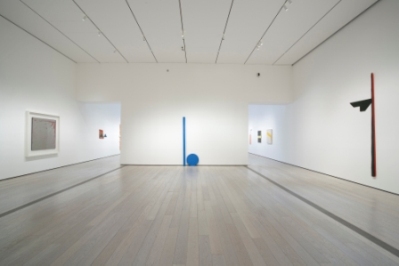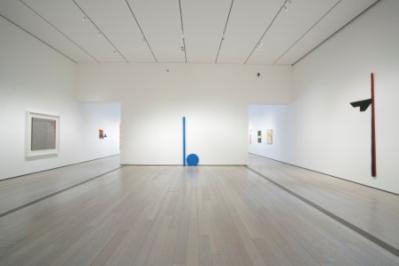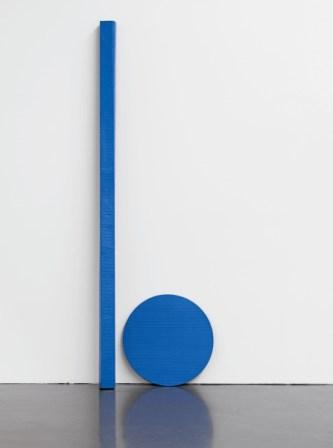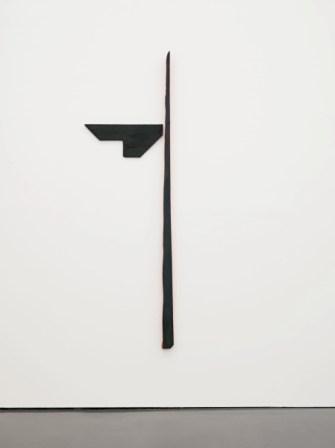Blinky Palermo: Retrospective 1964–1977, which closes this Sunday, is notably free of explanation in its presentation—rather, the artworks are left to speak for themselves. After touring the exhibition, artist Steve Roden imagined what would happen if that were literally the case.

Blinky Palermo, Blue Disk and Staff, 1968, private collection, courtesy Hauser & Wirth (left); Butterfly II, 1969, MMK Museum für Moderne Kunst, Frankfurt a. M.; former collection Karl Ströher, Darmstadt. Inv. Nr. 1981/36. 1-2.
blue disk and staff (blaue scheibe und stab, 1968): so you are called butterfly 2... you know, every time i hear the word butterfly, especially in german, i can’t help but think of walter benjamin, who wrote about catching them in nets as a child, as well as aby warburg, who spoke to moths and butterflies, telling his troubles to them. he called them his seelentierchen, or little soul animals. i wonder how many viewers have stood here quietly, sharing their troubles with us...
butterfly II (schmetterling, 1969): yes, being pinned to the wall i have heard a lot of things from a lot of different people... but of course, not only troubles...
blue disk and staff: looking at your form, that long stem with one “wing,” looks a bit broken or incomplete... it is no wonder you are unable to fly from the wall. with only one wing you can only fly in circles, like spinning a boat with one oar... have you ever thought about the fact that both of us are made up of two pieces? one of which is a large long “stem”...
butterfly 2: yes, of course, we’ve been staring at each other for some time, and certainly i’ve noticed the similarity of our body forms, but we also have our differences... you are resting on the floor, leaning against the wall, while i am fastened to the wall feeling somewhat crucified. to me, it seems a bit ironic that you are coated entirely in blue like a painting, yet rest upon the floor like a sculpture; while i am painted in such a way that my colored edges can only be perceived when moving around me like a sculpture—while i hang upon the wall like a painting...
blue disk and staff: hmm... well i must say the way your red edges are only revealed from the sides, reminds me of the time i first visited texas in the late summer, when little black grasshoppers reveal a tiny bit of hidden bright orange when they jump into the air. from where i’m resting now i can see your edges as bright red outlines; but if someone would drag me to the wall that faces you straight on, your red lines would disappear, and reappear only on the wall as a faint red aura. it is a beautiful dull reddish glow that follows your stem’s outline. because i am entirely wrapped in blue, my own edges tend to disappear, as my sides and faces have a tendency to fuse into a single flat visual plane...
butterfly 2: something else that i find interesting is that you can glean more about my color and form by moving away from me; while i can only begin to see the pattern and repetition of your blue when i am close enough to touch you. sometimes i wish i were a bit more mobile, so i could place my wing upon my stem, reach over to you, and touch your blue with my black. having looked at you for so long, i would really like to feel the texture of your blue tape-lines repeating beneath my “fingertips.” i have watched how your disk and staff appear as flat smooth monochromes from afar, but the repeated lines, when seen close up, seem to speak so much of activity and repetition, of handwork and wrapping, existing somewhere between the obsessive intuitive repetition of tramp art and the scored repetition of someone like sol lewitt. i also hope you won’t be offended if i tell you that your forms remind me a bit of don quixote...
- Blinky Palermo, Blue Disk and Staff, 1968, private collection, courtesy Hauser & Wirth
blue disk and staff: ha ha... yes, i have been told that before. also, because of the feeling of elongation, some have told me i am suggestive of a giaccometti. that may be true in terms of my form, but in terms of my surface, the inconsistent pressing of giacommetti’s thumbs and fingertips hardly resemble my own blue ridged contours, which were built through a continual addition of lines... your contours, on the other hand, seem more organic, like flat edges hand-scraped into curves. i keep thinking how my surface is covered in rigorous repetition, while yours is covered in subtle imperfection... it has taken me ages to notice the very thin, very faint incised white scar near the top of your stem. is it a marker for the height of your wing? or a key suggesting one must mine your surface for other subtle marks and imperfections? because i remain blue at all times, i think my lines suggest the surface of the sea, my skin an ocean of tiny consistent waves.... sometimes your red edges emanate such a deep colored glow, you seem filled with blood... i wonder if from your vantage point i ever seem filled with water... have you noticed that being wrapped in tape gives me a kind of forlorn feeling, a little bit like a broken arm in a cast?
butterfly 2: yes, well you know blue is not just the name of a color...
blue disk and staff: yes, of course... but since we are talking intimately, i want to ask you about your form. i hope you won’t be offended, but i have wanted to ask you this for some time... from my view it seems as if you are missing a wing; but now that we have been talking, i wonder if, perhaps, you are a silhouette with one wing situated behind the other. when i see you as having one wing, i feel sad that you are unable to fly, but when i see you as having two wings closed upon each other, i see you in a kind of space of anticipation, poised to fly away at any moment. this duality of suggestion sometimes makes you seem incomplete—your balance feeling slightly off—but at the same time, you seem visually “right.” i believe that the arrangement of your parts are somehow more sophisticated than mine... and their forms a bit more complex...
- Blinky Palermo, Butterfly II, 1969, MMK Museum für Moderne Kunst, Frankfurt a. M.; former collection Karl Ströher, Darmstadt. Inv. Nr. 1981/36. 1-2.
butterfly 2: well, i have often wondered about a similar tension between the complete and incomplete, as well as balance and imbalance, in my own appearance... clearly we are surrounded by works that suggest both presence and absence at the same time. in you i see a tension that seems to exist between order and happenstance, and i hope you won’t be offended if i tell you that your disc seems less placed than recently fallen... it seems to be so much more bound by gravity than my butterfly wing. also, you maintain a kind of casual-ness, while i maintain a kind of stiffness and immobility. you seem to be resting or sleeping—as if within a pause, awaiting some ritual or battle or other usefulness. my own existence is less like a tool, and more like an icon—continually immobile, static, a graphic at rest... i am an object of perpetual stasis, while you seem to contain a perpetual potential for motion... as if you are waiting for a call to duty... and one more thing—did you notice when one looks at you straight on, they see your staff and disk meeting on the floor, and your visual form resembles a lowercase “b”?
blue disk and staff: yes, and when i look at you straight on, you look not only a bit like the mast of a small sail boat with a tiny flag, but i can see your stem and wing suggesting the visual form of the number 4.
butterfly 2: well that means that, seen together reading from left to right, our forms form “b4” or “before.”
blue disk and staff: i think you’ve strayed a bit too far toward the interpretive deep end, but just now, while you were talking, i was watching people walk between us. seeing them next to you made me think that, even though we are tall, we are relatively human-scaled. our surfaces, which are far from perfect, reflect a kind of humanness, as their scars, carving, and wrapping reveal a visual history of our forming. our stems are thin and tall like a person, while our second parts could be held in someone’s hands. watching people stop and stand before us, seeing them move slowly around your sides and surface to see the red reveal and disappear, or intimately stooping down to see the linear contour map of my surface, it seems we converse with our audience rather quietly...
butterfly 2: yes, i think we slow them down, perhaps in relation to john cage’s words: “to sober and quiet the mind”... i really do think we do that for people... particularly if they spend enough time looking at us.
If you’d like to talk back to the artworks—or hear others talk about them—filmmaker and artist Morgan Fisher will be at LACMA tomorrow night to lead a tour of the exhibition and talk about Blinky Palermo.





